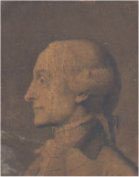A Portrait of Dr. William Small
William Small: Teacher, Scientist and Mentor
William Small was born in Forfarshire, Scotland, in 1734, the son of a Presbyterian minister. He attended Marischal College, Aberdeen, between 1751 and 1755 and was awarded his M.D. in 1765.
At the age of 23 in 1758, Small was appointed Professor of Natural Philosophy at William and Mary College, Virginia, then one of Britain’s American colonies. He restructured the curriculum and modernised teaching methods. He had a great impact on one of the students, Thomas Jefferson, who described him as “a man profound in most of the useful branches of science, with a happy talent of communication, correct and gentlemanly manners, and a large and liberal mind…from his conversation I got my first views of the expansion of science and of the system of things in which we are placed.”
In 1764 Small returned to Britain. He disliked the American climate and he suffered from poor health. From his symptoms it appeared as if he may have contracted malaria in Virginia. Armed with a letter of introduction to Matthew Boulton from Benjamin Franklin, the American scientist and philosopher, he settled in Birmingham in 1765. He established a medical practice in Birmingham, sharing a house with Dr John Ash who founded the General Hospital.
Between 1765 and 1775, Small acted as Boulton’s doctor and became a close friend of Darwin, Day, Keir, Watt and Anna Seward. Small was crucial to the success of the Lunar Society. His knowledge of mathematics, mechanics and chemistry provided him with an important intellectual role, advising on the development of the steam engine, engaging in chemical experiments alongside Boulton and Keir and designing clocks. He also involved himself in cultural activities helping to bring the Theatre Royal to Birmingham in 1774.
After recurring illness, Small died in 1775. The esteem in which he was held by his colleagues was immense, shown by the tributes they paid to him after his death. Small’s early death at the age of 41 has meant that he is not normally placed in the front rank of Lunar men, but he was pivotal to their success. As well as his intellectual expertise, he was a highly significant networker, creating contacts and easing potential conflicts between the personalities who composed the Lunar Society.
Sources and Further Reading
Schofield, Robert E., The Lunar Society, A Social History of Provincial Science and Industry in Eighteenth Century England (Oxford, Clarendon Press, 1963)
Uglow, Jenny, The Lunar Men: The Friends who made the Future 1730-1810 (London, Faber and Faber, 2002)






